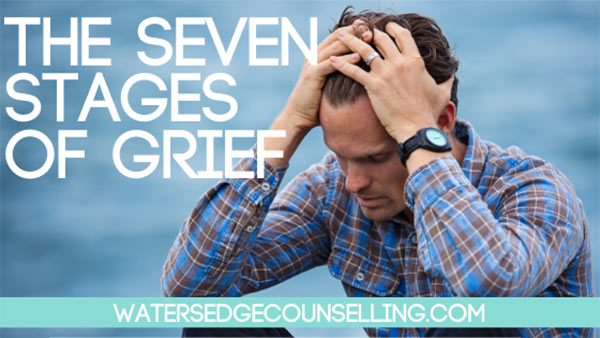
There are well documented grieving stages, which show that difficult emotions in grief are to be expected. Although dealing with grief is personal, with no set rules, there is a general understanding of how it tends to progress in people.
Some knowledge of this journey can help to put into perspective your sense of loss. Here is an overview of some typical stages of grief you may experience on your road to recovery. If you have lost a loved one, or perhaps even a beloved pet, then you may be able to track your own journey through these steps.
Shock and disbelief
It is not surprising to hear that our first reaction to hearing about death is shock. We will be stunned at such a significant piece of news. Yet, in times of grief, our brain tries to protect us by triggering disbelief. The point of this reaction is to suspend the pain a little and so stop you feeling overwhelmed.
Consequently, to feel numb and distant at first is understandable. It is difficult to say how long this stage will last as it depends on your personality, your relationship with the person that has died and how much you were expecting the loss. There is no set formula, and sometimes we are surprised by the strength of feeling for someone we did not even know mattered so much to us.
Denial
You are trying to cope. You don’t want to accept the loss at this point. Although you may have intellectually accepted that the person has died, your emotional self may have decided it is not happening. This suspension of belief allows the pain to seep in gradually as acceptance settles. You may deny that the person has gone, or you may deny that it has impacted you at all. You will have put it in a box and placed it on a shelf in your mind for later, when you feel more capable of exploring the emotions.
Guilt
Studies suggest that guilt is common in what is called “complicated grief”. Often a sense of guilt, especially if the death was sudden or in unnatural circumstances, can overwhelm us. There is a sense that we could and should have been there or done something differently.
Such feelings of guilt can lead to rumination, which is a primary feature of depression. We can get lost in the thoughts and struggle to think about anything else. Alternatively, you may go to the opposite extreme, where you take extreme measures to avoid thinking and remembering your loved one.
Thoughts and feelings that begin with “If only I had or hadn’t…” are to be expected to a degree during grief. However, in violent deaths and suicides, it is a likely response for those close to the person who died.
Anger and bargaining
When the sense of disbelief abates and guilt emerges, the mix of emotions can lead to irritation. You will have a lot of pent up feelings and these will need to be released. Anger and frustration at not being able to control the situation and make anything different can be powerful. You will be working through the negotiation of thoughts about what could have been done differently.
Depression and loneliness
Potentially one of the more difficult stages of grief is the period after the initial flurry of activity. When someone dies, some events must take place. There might be an investigation and there will be a funeral. People will visit and everyone will be willing to talk to you about your grief. Then, others move on and you will be left to reflect on your loss alone.
You will likely experience acute sadness during this period, which could leave you stuck. You may be concerned that if you move on from this period that you will disrespect the memory of the person who has died.
The rebuild
There will come the point when you begin to work through the feelings, and you realise you have no power to change the situation. You will not forget the death, but it will gradually begin to feel like a new normal for you. You will start to reframe your life with the person missing and begin with new routines without them.
Acceptance
You feel the loss still. However, you now feel that you can move forward with your new life. You may now feel ready to clean out their room, for instance, or start a new hobby that defines your time without them.
Are you grieving a loved one, a relationship or a pet? Do you feel stuck, and unable to move on with your life? Here’s what you need to do: Contact Colleen on 0434 337 245, Duncan on 0434 331 243 or Rachel on 0442 177 193 for a FREE 10 minute consultation on how we can best help you or book online.
Leave a Reply